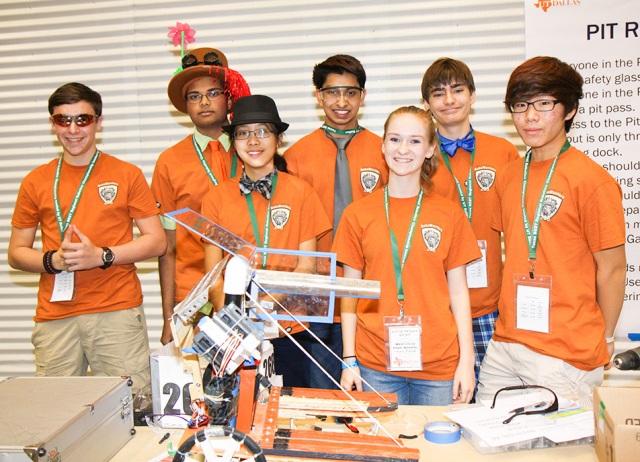Jan 22 2016
UT Dallas recently hosted the BEST Regional Championship for Robotics at the Curtis Culwell Center in Garland, Texas. More than 3,200 students from four states competed to see which robot design could best extract five natural resources — coal, iron, aluminum, copper and lithium — from a pretend mine.
 The team from Westwood High School in Austin designed its robot with skatelike barriers on the bottom for smoother driving. "We were having a bit of a problem going over stuff, so we built the barriers to reduce friction," said Nathan Mara, one of the team members.
The team from Westwood High School in Austin designed its robot with skatelike barriers on the bottom for smoother driving. "We were having a bit of a problem going over stuff, so we built the barriers to reduce friction," said Nathan Mara, one of the team members.
Alongside the students were volunteers from industry and academia who donated their time and talents to celebrate student achievement and move the dial on science, technology, engineering and math (STEM) interests.
“The BEST program is an excellent way to inspire young learners with inquiring minds to pursue college and career paths in STEM,” said Dr. Lani Connolly, director of the UT Dallas Science and Engineering Education Center, who also serves as the Texas director for BEST Robotics. “It gives our youth the opportunity to work together to develop tangible solutions to real-world problems. In doing so, they experience how fun and relevant STEM is. They learn how to work on addressing the challenges of our time and making the world a better place. It has been a thrill to see the innovative approaches the students develop when given the freedom to create.”
Dr. James Carter, professor emeritus of geosciences, partnered with Hunt Oil and High Mark Energy to offer a series of Exploration Stations to educate attendees on each of the natural resources from the challenge. Other highlights from the competition included a panel discussion on women in engineering in which students interacted with female employees from Texas Instruments, Raytheon, Exxon and other area companies; campus tours of research facilities; and a keynote address from Dr. Nicholas Gans, assistant professor of electrical engineering, who demonstrated several working prototypes of robots for the crowd.
UT Dallas’ Science and Engineering Education Center and the Erik Jonsson School of Engineering and Computer Science have hosted the Texas BEST Regional Robotics Championship since 2011. The event also was funded in part by Texas Instruments, MathWorks, Rockwell and Lockheed Martin.